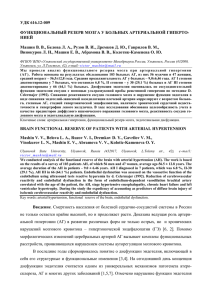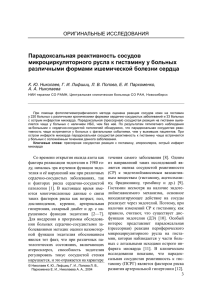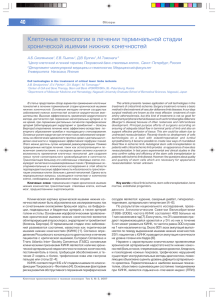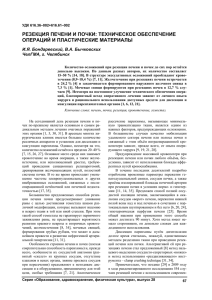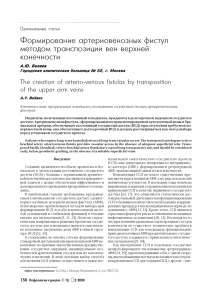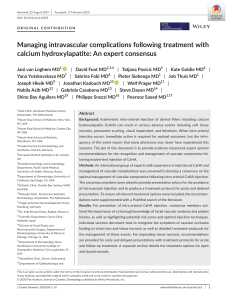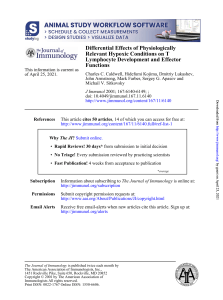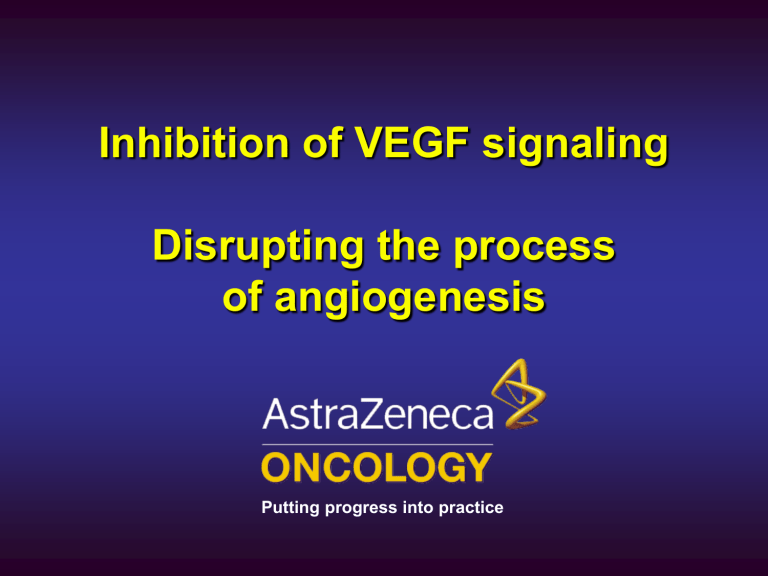
Inhibition of VEGF signaling Disrupting the process of angiogenesis Putting progress into practice Angiogenesis • • Angiogenesis is the formation of new blood vessels from pre-existing vasculature Angiogenesis is highly dependent on the VEGF signaling pathway – • • • VEGFR-2 is the most important VEGF signaling pathway for angiogenesis VEGF is frequently overexpressed in cancer and is associated with poor prognosis Without a blood supply, tumors do not grow larger than 1–2mm As tumors grow they become hypoxic, which leads to the up-regulation of angiogenic factors such as VEGF – Stimulates the production of new vasculature Tumor angiogenesis 5. Intravasation 1. Secretion of angiogenic factors 2. Proteolytic destruction of ECM Tumor 4. Appearance of new tumor vasculature 3. Endothelial cell proliferation and migration Sprouting capillary ECM, extracellular matrix Summary of VEGF function • VEGF is a key angiogenic regulator directly implicated in – endothelial cell proliferation – endothelial cell migration – endothelial cell protease expression – endothelial cell adhesion – capillary tube formation – vessel maturation/pericyte recruitment • It also acts as – a survival factor for newly formed vasculature – Vascular Permeability Factor Activation of VEGF receptor signaling PlGF VEGF-A VEGF-B VEGF-A VEGF-C VEGF-D VEGF-C VEGF-D Blood vascular endothelial cell VEGFR-1 VEGFR-2 VEGFR-3 Lymphatic vascular endothelial cell Proliferation, vascular permeability, migration, survival PlGF, placental growth factor VEGFR, vascular endothelial growth factor receptor Inhibition of VEGF signaling • Inhibiting VEGF signaling – inhibits growth of new tumor vessels – decreases vascular density, diameter and permeability – may induce regression of recently developed tumor microvessels • Therapeutic inhibition of tumor angiogenesis should be effective in a broad range of solid malignancies • Target tissue is in direct contact with blood, facilitating drug delivery Approaches to the inhibition of VEGF signaling Ligands Monoclonal antibody VEGF-A VEGF-B VEGF-C VEGF-D Anti-VEGF antibodies Blood vascular endothelial cell Lymphatic vascular endothelial cell VEGFR-1 VEGFR-2 VEGFR-3 Approaches to the inhibition of VEGF signaling Ligands VEGF-A VEGF-B VEGF-C VEGF-D VEGFR-TKIs Lymphatic vascular endothelial cell Blood vascular endothelial cell VEGFR-TKI VEGFR-1 Inhibition X X VEGFR-2 X Angiogenesis VEGFR-3 X Lymphangiogenesis VEGFR-TKI, vascular endothelial growth factor receptor-tyrosine kinase inhibitor VEGFR tyrosine kinase research at AstraZeneca • Preclinical studies have evaluated the potency, selectivity, anti-angiogenic and antitumor activity of VEGFR tyrosine kinase inhibitors (VEGFR-TKIs) at AstraZeneca • The lead VEGFR-TKI is currently in Phase II/III trials in NSCLC and CRC, and work is also ongoing to determine the activity in a wide range of other tumors
